
The Internet is smart, but how do we outsmart the smart? With tons of information available online, the question lies in…
How to evaluate these information?
Filter bubbles and echo chambers keep us within the perimeters of what the Internet wants us to see based on our past interactions thus it is important to manage them.
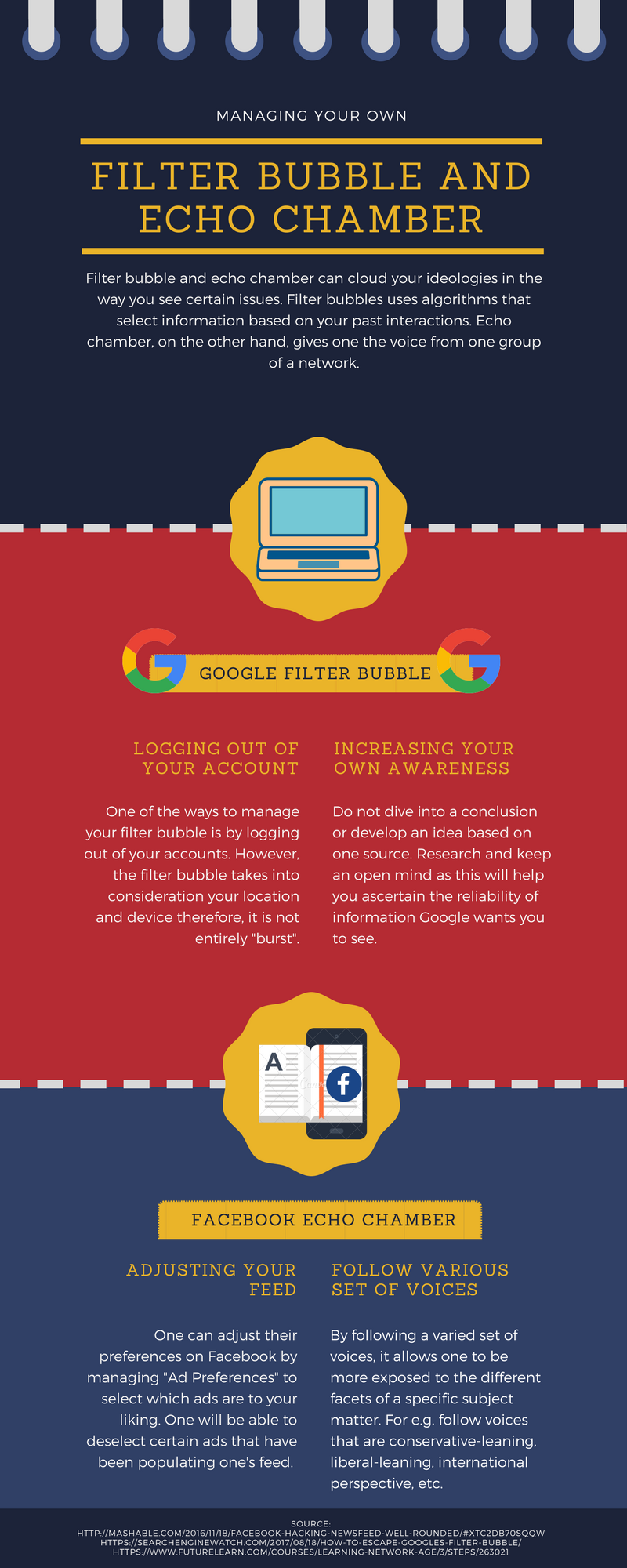
We should be careful of fake news and take online information, especially those on social media, sceptically. Instagram is an example of echo chamber with many influencers doing sponsored posts. When they are sponsored/paid for a post, does it affect the credibility of the medium/user? Below are examples of sponsored advertisements.
Source: @naomineo & @melinairwan
To determine if such sponsored posts are credible, it is crucial to look at the 2 perspectives the source provides – the user and medium perspective. Using Li and Suh (2015) 5 factors and the CRAAP test, let’s evaluate @melinairwan’s post against Allergy Insight’s blog.
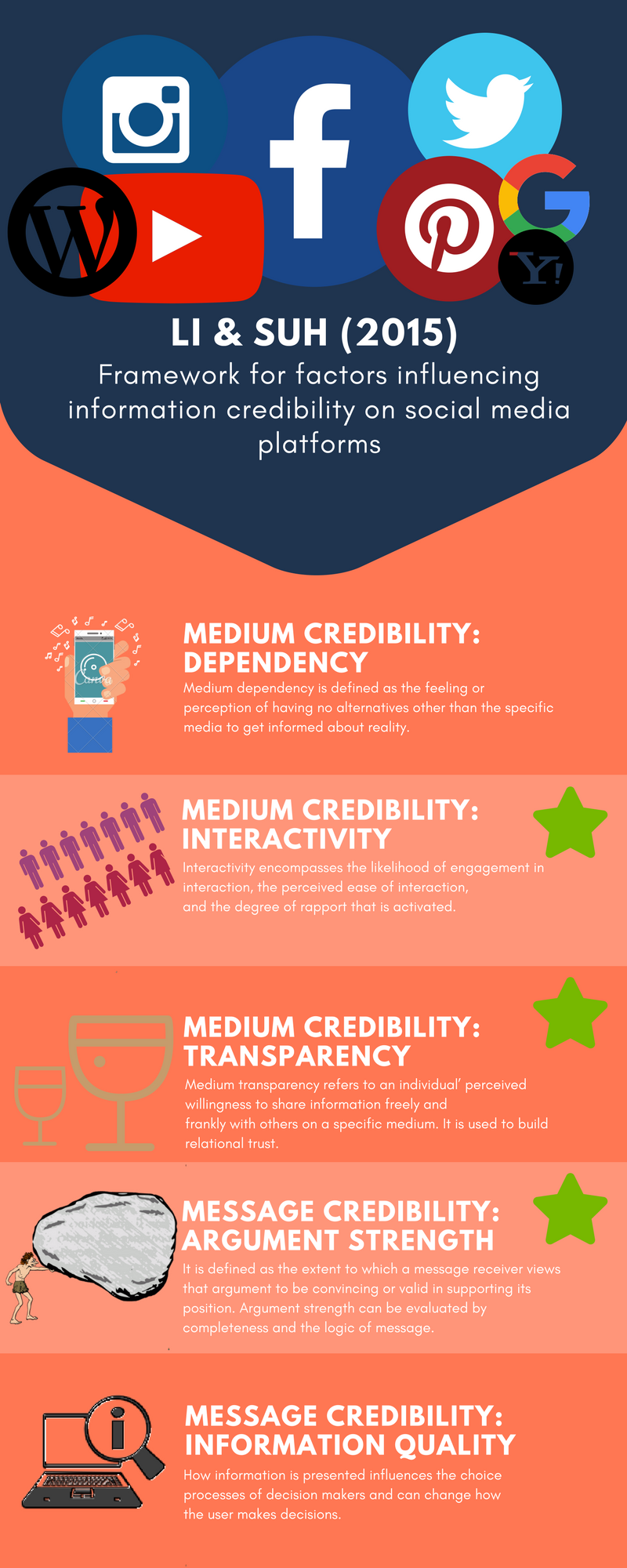
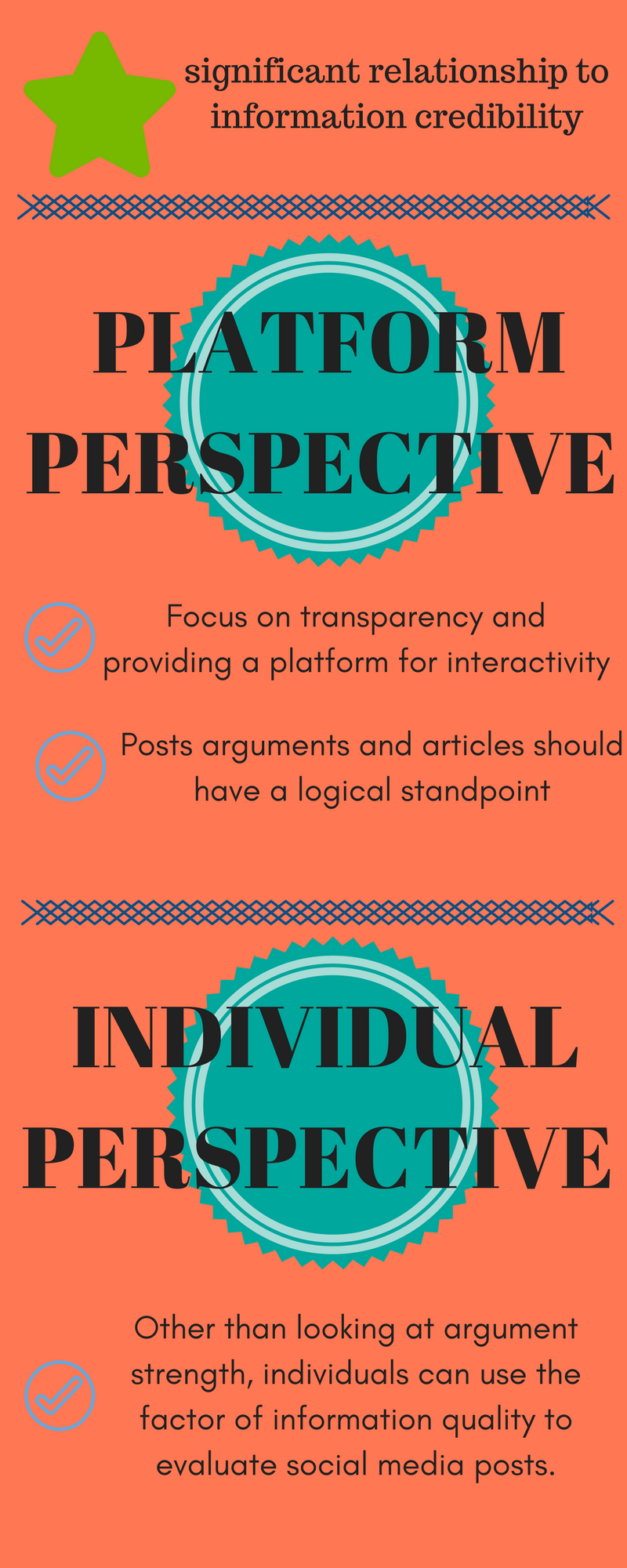
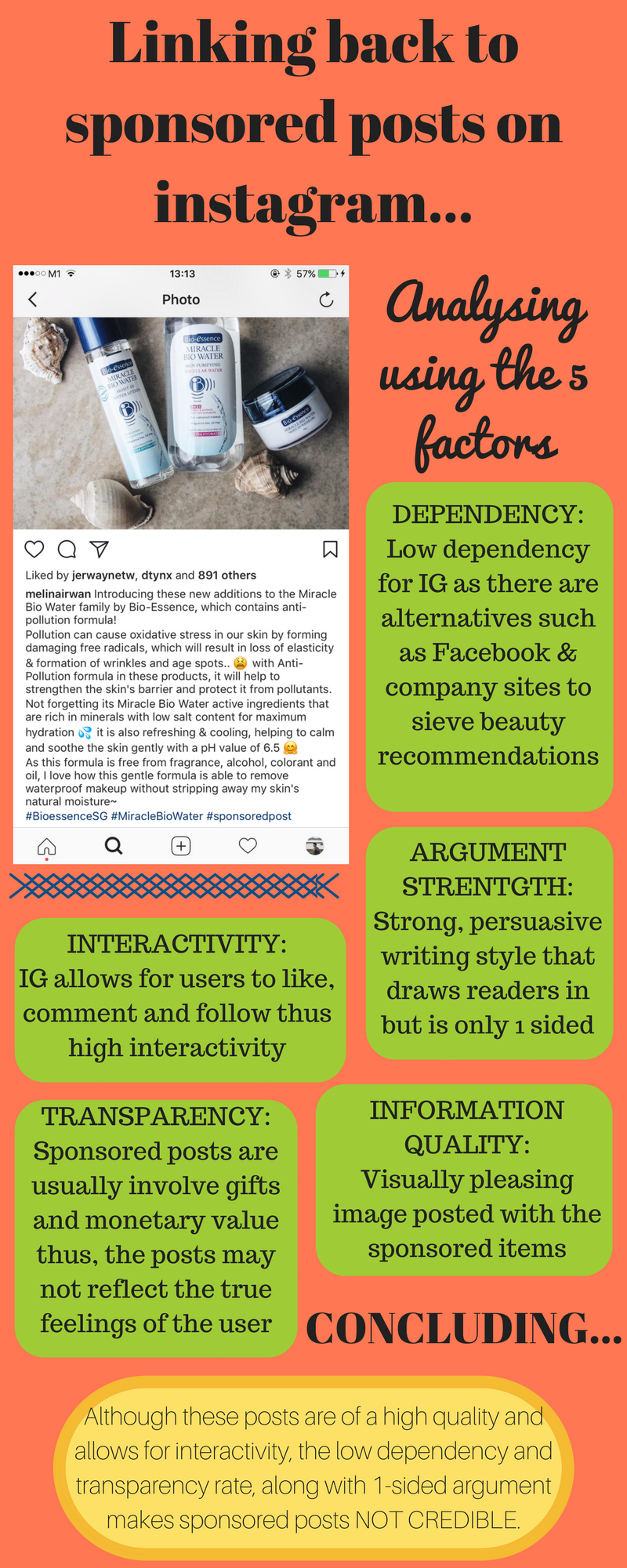
Self-produced; source from Li & Suh (2015)
What sets the 2 sources apart are the strong argument, transparency and accuracy of the blog post whereby the author is an authoritative figure who published many articles on the subject matter making Allergy Insight more creditable. Research has proved that point whereby social media platforms are losing users trust whereas owned media is gaining trust. (Titcomb and Carson, 2017)
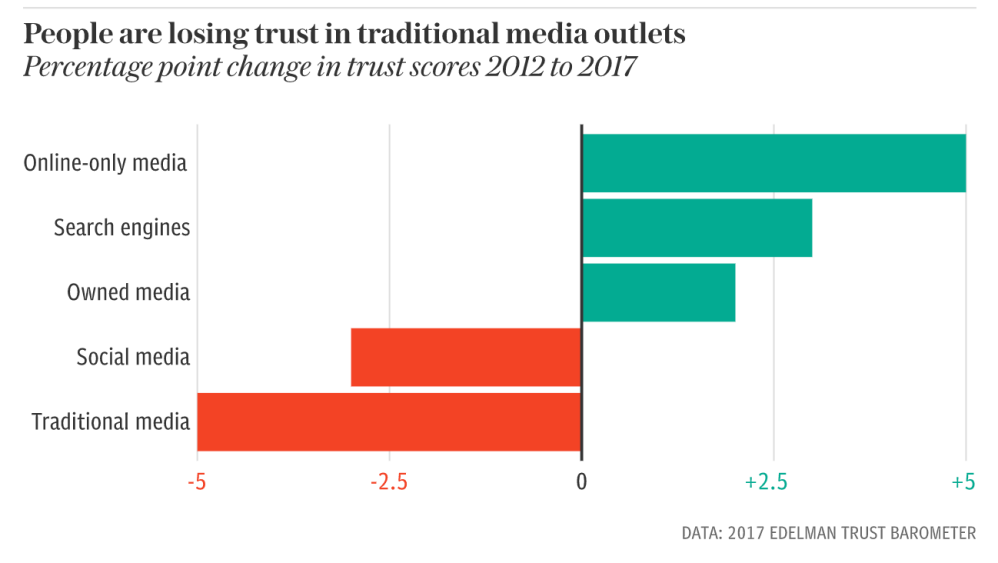
On top of unauthentic posts from social media, fake news are everywhere. Here are some guidelines regarding evaluating online data and identify fake news!
Self-produced; various sources
Summing up, our digital differences play a pivotal role in how we evaluate online information. For instance, PHD holders are more able to dissect the reliability of an information compared college students. However, our echo chambers are always prevalent despite our digital and educational gaps. (Kluger, 2017) Thus, it is crucial we widen our networks and research widely.
INTERNET V.S. YOU; WHO WINS?
(Word Count: 300)
References:
BrainyQuote. (2017). Information Quotes – BrainyQuote. [online] Available at: https://www.brainyquote.com/topics/information [Accessed 15 Nov. 2017].
Ensor, S., Boyd, C., Moore, J., Sentance, R. and Smarty, A. (2017). How to escape Google’s filter bubble | Search Engine Watch. [online] Searchenginewatch.com. Available at: https://searchenginewatch.com/2017/08/18/how-to-escape-googles-filter-bubble/ [Accessed 15 Nov. 2017].
FutureLearn. (2017). Data Literacy – Learning in the Network Age – University of Southampton. [online] Available at: https://www.futurelearn.com/courses/learning-network-age/3/steps/263023 [Accessed 15 Nov. 2017].
FutureLearn. (2017). Information Literacy – Learning in the Network Age – University of Southampton. [online] Available at: https://www.futurelearn.com/courses/learning-network-age/3/steps/263022 [Accessed 15 Nov. 2017].
FutureLearn. (2017). Media Literacy – Learning in the Network Age – University of Southampton. [online] Available at: https://www.futurelearn.com/courses/learning-network-age/3/steps/263021 [Accessed 15 Nov. 2017].
Gazzola, A. (2017). Are oats good for eczema?. [online] Allergy Insight. Available at: http://www.allergy-insight.com/are-oats-good-for-eczema/ [Accessed 15 Nov. 2017].
GigaLaw. (2017). Legal Services. [online] Available at: https://giga.law/legal-services/ [Accessed 15 Nov. 2017].
GIPHY. (2017). Star Trek Information Overload GIF by arielle-m – Find & Share on GIPHY. [online] Available at: https://giphy.com/gifs/arielle-m-star-trek-information-overload-3o6gDSdED1B5wjC2Gc/links [Accessed 15 Nov. 2017].
Irwan, M. (2017). Instagram post by Melina Irwan • Sep 2, 2017 at 12:17pm UTC. [online] Instagram. Available at: https://www.instagram.com/p/BYic-DtBooB/?hl=en&taken-by=melinairwan [Accessed 15 Nov. 2017].
Kayser-Bril, N. (2017). Become Data Literate in 3 Simple Steps – The Data Journalism Handbook. [online] Datajournalismhandbook.org. Available at: http://datajournalismhandbook.org/1.0/en/understanding_data_0.html [Accessed 15 Nov. 2017].
Kluger, J. (2017). Why Smart People Still Believe Conspiracy Theories. [online] Amp.timeinc.net. Available at: http://amp.timeinc.net/time/5023383/conspiracy-theories-reasons-believe [Accessed 15 Nov. 2017].
Kulp, P. (2017). Escape the echo chamber: How to fix your Facebook News Feed. [online] Mashable. Available at: http://mashable.com/2016/11/18/facebook-hacking-newsfeed-well-rounded/#xtC2Db70sqqW [Accessed 15 Nov. 2017].
Li, R. and Suh, A. (2015). Factors Influencing Information credibility on Social Media Platforms: Evidence from Facebook Pages. Procedia Computer Science, [online] 72, pp.314-328. Available at: http://www.sciencedirect.com/science/article/pii/S1877050915036078 [Accessed 14 Nov. 2017].
Neo, N. (2017). Instagram post by Naomi Neo 梁文珊 • Aug 29, 2017 at 9:53am UTC. [online] Instagram. Available at: https://www.instagram.com/p/BYX5U1pllxA/?hl=en&taken-by=naomineo_ [Accessed 15 Nov. 2017].
Titcomb, J. and Carson, J. (2017). Fake news: What exactly is it – and can it really swing an election?. [online] The Telegraph. Available at: http://www.telegraph.co.uk/technology/0/fake-news-exactly-has-really-had-influence/ [Accessed 15 Nov. 2017].
Tyburski, G. (2017). How To Evaluate Information — Checklist :: Justia Virtual Chase. [online] Virtualchase.justia.com. Available at: https://virtualchase.justia.com/how-evaluate-information-checklist/ [Accessed 15 Nov. 2017].
YouTube. (2017). Evaluating sources. [online] Available at: https://www.youtube.com/watch?v=j8OAPxcXibo [Accessed 15 Nov. 2017].


Hey Nic!
Amazing work done! I really love the visuals that you have added which I could tell that you had put a lot of effort in. The content was also well thought out and you gave some useful advice on how to manage your own filter bubbles and echo chambers.
I would like to also share my own insight into the topic. I feel that the comment section is commonly under-appreciated as a tool to help us access information quality on the Web. It enables us to share our thoughts and receive feedbacks that could challenge our beliefs which improves our media literacy. Regarding data & information literacy, people can use it to warn others of an unreliable source with supporting evidence by simply commenting.
The idea of enabling comments on blogs has been heavily debated on in the past.
https://fizzle.co/sparkline/debate-should-you-allow-comments-on-your-blog-find-out-what-two-remarkably-popular-bloggers-think
Would love to hear your thoughts on this!
LikeLiked by 1 person
Hi Aaron,
Thanks for stopping by and for your kind words! 🙂
After reading the debate you shared, I feel that allowing comment on blog has more pros than cons. Although I understand that some comments are unrelated and a waste of time, but it provides a great platform for interactivity (which is one of the significant factors used in the study by Li and Suh). This form of interactivity will allow you to dive deeper into the subject matter, and broadening your scope of thoughts. This could possibly be one way to escape your echo chamber! In addition, quality commenting will allow for better performance in Search Engine Optimization (SEO) and thus allowing you to build quality backlinks! (https://www.shoutmeloud.com/blogging-why-commenting-is-very-important-for-your-blog.html)
If you ever have to off the comment section of your blog, what would be the main reason to do so?
LikeLike
Hey Nic!
For me personally, I would always keep the comment section on my blog. Because relating back to the topic, sometimes I feel like I do get trapped in my own echo chamber and filter bubble. Thus, by receiving feedback from others, it helps me to explore new ideas and develop a rational thinking when approaching such ideas. But if I ever have to turn off the comment section, it would probably be to get rid of all the unwanted comments.
LikeLiked by 1 person
Hi Nic, thanks for your valuable post, splendid job on the collaterals and infographics. I stand in agreement with you on the issue of Influencer Marketing. In my opinion, Influencer Marketing is tacky, and is more often than not, exaggerated. Exaggerated truths are in some ways misguiding, to the ignorant folks. In extreme cases, people’s reputation and health may be jeopardised as a result of the lack of Influencers’ guarantee on product usage (https://www.forbes.com/sites/forbestechcouncil/2017/06/16/when-influencers-peddle-click-bait-and-fake-news-everyone-loses/#11c185836091). With social media having a spread like wildfire, there is bound to be misguided advertisements everywhere, it is our individual responsibility to know and educate the oblivious. Such advertisements should be taken with a pinch of salt, and not be shunned away so quickly.
Also, as you mentioned on the prevalence of echo chambers despite educational and digital gaps, don’t you think conspiracies/stereotypes hold a bit of truth, hence even the experts are in the believe. (https://www.theodysseyonline.com/accuracies-stereotypes)
Would love to hear your inputs on the discussed!
LikeLiked by 1 person
Hey Amoz!
Glad that you enjoyed my post! Regarding the issue you mentioned, experts are also humans and it is worth noting that most of the stereotypes that we cultivate are from our parents (our first and most influential teachers!). For example, I’m sure when you were young, your parents would threatened you that if you don’t behave well, the “bangala” will catch you. These stereotypes are brought up when we were young and had no experience to debunk it so we accepted it and moved forward with it. Another possibility is the cognitive efficiency. As humans, we tend to find the easiest way to do things, i.e. categorising groups or information together. This cognitive efficiency then develops a stereotype and being shared as untrue statements of that group. (https://msu.edu/course/psy/442/stereotypes.ppt/sld003.htm)
Above all, stereotypes will remain stereotypes until debunked and it is due to our echo chambers that resulted in these stereotypes.
LikeLike
Hi Nicholas! I liked how you mentioned the echo chamber on Instagram and the credibility of influencer’s post. Influencers do have control over a large audience and it’s important to know when a post is sponsored. However, how good are we at separating fact from fiction when it comes to digitally manipulated photos?
Fact-checking our sources through currency, relevance, authority, accuracy and purpose, is the fundamentals to identifying fake-news, but what if the information is supported by photographic “evidence”? Sites like Twitter and Facebook rapidly share information just by a click of a button, is notorious for sharing fake-photos (Hern, 2017).
A test done showed that only 60% of participants could tell that an image was faked, with only 45% of participants being able to identity what has been altered in a photo (Wan, 2017). In one news, a Sikh man was falsely accused of being a terrorist after a doctored photo went viral of him wearing a bomb vest (Mastroianni, 2015).
What are you thoughts about photo-manipulated imagery in fake-news?
(Word count: 166)
Reference:
Hern, 2017. Facebook and Twitter are being used to manipulate public opinion – report (online). Retrieved from: https://www.theguardian.com/technology/2017/jun/19/social-media-proganda-manipulating-public-opinion-bots-accounts-facebook-twitter
Wan, 2017. Many people can’t tell when photos are fake. Can you? (online). Retrieved from: https://www.washingtonpost.com/news/speaking-of-science/wp/2017/07/17/many-people-cant-tell-when-photos-are-fake-can-you/?tid=ss_tw&utm_term=.2dc9fcf2a72c
Mastroianni, 2015. Doctored photo wrongly accused Sikh man of Paris attack (online). Retrieved from: https://www.cbsnews.com/news/sikh-man-wrongly-accused-of-being-paris-terrorist-in-altered-image/
LikeLike
Hi Marianne,
Really interesting point regarding manipulated images! Usually, I don’t check if the image used is being manipulated or doctored unless it’s pretty obvious. It would take quite sometime to process and think if an image is actually doctored. However, it is a good practice for us to try to identify these images and not fall into the traps. I think going forward, this is actually important, as influencers are focusing on Instagram (a photo posting app) in the next year. (https://www.marketingprofs.com/charts/2017/33095/influencers-top-social-networks-for-2018). In addition, a thumb nail picture is what we usually look at first when we see news from social media. Therefore, it could sway our decision to open the potential “click-bait” with a doctored image.
It is really unethical for sources to do so, especially if the image is manipulated to damage an individual. But the question lies in how we identify these images? I found a useful link that you may want to check it out. (https://lifehacker.com/how-to-tell-if-a-photo-has-been-doctored-1797049627) Also, I’d be adding this insight to my reflection post so keep an eye for it! 🙂 Do let me know if you have any other ways to identify fake images too!
LikeLiked by 1 person
Hi Nicholas, you are absolutely right! How often can we identify whether an image has been doctored or not? Most of the time it takes a trained eye to spot the difference and even for myself, I sometimes can’t tell the difference if it’s almost perfect editing. Thanks for the link, it’s insightful to know if a photo has been doctored through these useful tips!
A thing I’ve also learnt when I want to check the source & origin of an image is to do a quick Google search with an image (Search by Image), to find out if there are other sources that the image is available on.
I think that could potentially save myself from being catfished too 😉
Cheers!
LikeLike